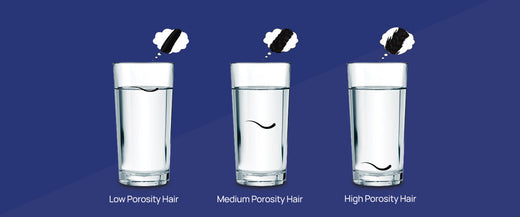टेलोजन एफ्लुवियम के लक्षण, कारण, निदान और उपचार
Evidence Based
All the information in this blog post is accurate, trustworthy, scientifically based and has been written and fact-checked by our experts and doctors.
Our licensed nutritionists and dietitians are committed to being objective, unbiased and honest, presenting all sides of the argument.
This article includes scientific references in brackets, which are clickable links to research papers from reputable academic organizations.

बालों का झड़ना किसी के लिए भी एक चुनौतीपूर्ण अनुभव हो सकता है, चाहे आप पुरुष हों या महिला। मान लीजिए कि आपने सामान्य से ज़्यादा बाल झड़ते हुए देखे हैं। उस स्थिति में, आप टेलोजेन एफ्लुवियम से जूझ रहे होंगे - तनाव, खराब पोषण या अचानक जीवनशैली में बदलाव के कारण होने वाली एक अस्थायी लेकिन आम स्थिति। अच्छी खबर? सही देखभाल और ध्यान से इस तरह के बालों के झड़ने को ठीक किया जा सकता है। आइए कारणों, संकेतों और उन कदमों को समझें जिन्हें आप अपने बालों को फिर से घने और स्वस्थ बनाने के लिए उठा सकते हैं।
टेलोजन एफ्लुवियम क्या है?
टेलोजन एफ्लुवियम एक अस्थायी बाल झड़ना है जो तब होता है जब बालों के रोमों का एक बड़ा-से-सामान्य प्रतिशत बाल विकास चक्र के आराम (टेलोजन) चरण में प्रवेश करता है। इससे अत्यधिक बाल झड़ते हैं और पतले होते हैं। पुरुष या महिला पैटर्न गंजापन जैसी स्थायी बाल झड़ने की स्थिति के विपरीत, टेलोजन एफ्लुवियम आमतौर पर प्रतिवर्ती होता है।
बाल चक्र में 3 चरण होते हैं:
- एनाजेन या वृद्धि चरण.
- कैटाजेन या संक्रमणकालीन चरण.
- टेलोजन या विश्राम अवस्था.
आम तौर पर, 85-90% बाल रोम वृद्धि चरण (एनाजेन) में होते हैं, जबकि 10-15% टेलोजेन चरण में होते हैं। हालांकि, टेलोजेन एफ्लुवियम में, 30% तक बाल झड़ने के चरण में प्रवेश करते हैं, जिससे बालों का झड़ना स्पष्ट रूप से दिखाई देता है। हालाँकि यह स्थिति महिलाओं में सबसे आम है, लेकिन यह किसी को भी प्रभावित कर सकती है।
टेलोजन एफ्लुवियम के संकेत और लक्षण
टेलोजन एफ्लुवियम का प्राथमिक लक्षण बालों के झड़ने में वृद्धि है। लोगों को अपने तकिए, ब्रश या बाल धोने के बाद नाली में सामान्य से अधिक बाल दिखाई दे सकते हैं। अन्य लक्षणों में शामिल हैं:
- सिर की त्वचा पर बालों का पतला होना, जो प्रायः सिर के शीर्ष भाग पर सबसे अधिक दिखाई देता है।
- बालों को ब्रश करते या धोते समय अत्यधिक बाल झड़ना।
- गंजेपन के धब्बे के बिना धीरे-धीरे बालों का पतला होना।
यह ध्यान रखना महत्वपूर्ण है कि टेलोजन एफ्लुवियम के कारण बाल पूरी तरह से नहीं झड़ते, बल्कि इससे बाल पतले हो सकते हैं, जो विशेष प्रकाश में या बालों को विशेष तरीके से स्टाइल करने पर अधिक ध्यान देने योग्य हो सकते हैं।
टेलोजन एफ्लुवियम के कारण
टेलोजन एफ्लुवियम आमतौर पर बाल विकास चक्र में गड़बड़ी के कारण उत्पन्न होता है, और कई कारक इस स्थिति का कारण बन सकते हैं:
- तनाव: गंभीर शारीरिक या भावनात्मक तनाव, जिसमें आघात, सर्जरी या बालों का झड़ना शामिल है, बालों के चक्र को बाधित कर सकता है। ट्रिगरिंग घटना के 2-4 महीने बाद अक्सर बाल झड़ना शुरू हो जाता है।
- पोषक तत्वों की कमी: प्रोटीन, आयरन और जिंक जैसे आवश्यक पोषक तत्वों की कमी से बालों की वृद्धि बाधित हो सकती है।
- अचानक वजन घटना: तेजी से वजन घटना या प्रतिबंधित आहार के कारण बाल समय से पहले ही झड़ने लगते हैं।
- हार्मोनल परिवर्तन: गर्भावस्था, प्रसव या रजोनिवृत्ति के कारण होने वाले हार्मोनल उतार-चढ़ाव टेलोजन एफ्लुवियम के सामान्य ट्रिगर हैं।
- दवाएं: कुछ दवाएं, जैसे बीटा-ब्लॉकर्स, एंटीकोएगुलेंट्स और रेटिनोइड्स, बालों के झड़ने का कारण बन सकती हैं।
- स्वास्थ्य स्थितियां: स्वप्रतिरक्षी रोग, थायरॉयड विकार और संक्रमण जैसी स्थितियां टेलोजन एफ्लुवियम को ट्रिगर कर सकती हैं।
- सर्जरी या बीमारी: बड़ी सर्जरी या लंबी बीमारी सामान्य बाल चक्र को बाधित कर सकती है।
- विषाक्तता: धातुओं सहित कुछ रसायनों के संपर्क में आने से बाल झड़ सकते हैं।
टेलोजन एफ्लुवियम का निदान
टेलोजन एफ्लुवियम का निदान करने के लिए, डॉक्टर आमतौर पर खोपड़ी और बालों की शारीरिक जांच करते हैं। वे निम्नलिखित परीक्षण भी कर सकते हैं:
- बाल खींचने का परीक्षण: इस परीक्षण में बालों के छोटे-छोटे हिस्सों को धीरे-धीरे खींचकर उनके झड़ने का आकलन किया जाता है।
- रक्त परीक्षण: यह पता लगाने में मदद कर सकता है कि क्या कोई अंतर्निहित स्थिति है, जैसे एनीमिया, थायरॉयड विकार या अन्य स्थितियां।
- धुलाई परीक्षण: इस परीक्षण में धुलाई के दौरान झड़े बालों की संख्या की गणना की जाती है, जिससे झड़ने की मात्रा का पता लगाया जा सके।
त्वचा विशेषज्ञ बालों के स्वास्थ्य के अन्य लक्षणों पर भी ध्यान दे सकते हैं, जैसे कि सिर की स्थिति या बालों के पतले होने का पैटर्न, ताकि अन्य प्रकार के बालों के झड़ने, जैसे कि एलोपेसिया एरीटा, का पता लगाया जा सके।
टेलोजन एफ्लुवियम का इलाज कैसे करें?
हालांकि टेलोजन एफ्लुवियम के लिए कोई विशिष्ट उपचार नहीं है, लेकिन अंतर्निहित कारण को संबोधित करने के बाद अक्सर स्थिति को ठीक किया जा सकता है। यहाँ कुछ कदम दिए गए हैं जो मदद कर सकते हैं:
1. ट्रिगर को संबोधित करना:
टेलोजन एफ्लुवियम के प्रबंधन में पहला कदम अंतर्निहित कारण की पहचान करना और उसका समाधान करना है। उदाहरण के लिए:
- तनाव प्रबंधन : ध्यान, चिकित्सा या जीवनशैली में बदलाव जैसी विश्राम तकनीकों के माध्यम से तनाव को प्रबंधित करने से तनाव को कम करने में मदद मिल सकती है।
- पोषण संबंधी सहायता: संतुलित आहार या पूरक आहार से पोषण संबंधी कमियों को ठीक करना।
2. बालों की देखभाल के तरीके:
कठोर उपचार, रासायनिक हेयर डाई और अत्यधिक हीट स्टाइलिंग से बचें, क्योंकि ये बालों के झड़ने को बढ़ा सकते हैं। कोमल, पौष्टिक हेयर केयर उत्पादों का चयन करें।
3. पूरक:
जिन लोगों में विटामिन की कमी है, उनके लिए सप्लीमेंट्स लेना (चिकित्सकीय देखरेख में) बालों के स्वास्थ्य को बेहतर बनाने में मदद कर सकता है। बायोटिन, आयरन, जिंक और विटामिन डी जैसे पोषक तत्व बालों के दोबारा उगने में मदद करने के लिए जाने जाते हैं।
4. दवाएं:
हालांकि टेलोजन एफ्लुवियम के लिए कोई विशेष दवा नहीं है, लेकिन मिनोक्सिडिल जैसे उपचारों का उपयोग बालों के रोम को उत्तेजित करने और बालों के दोबारा उगने को बढ़ावा देने के लिए किया जा सकता है। यह ओवर-द-काउंटर सामयिक उपचार बालों के रोम को उत्तेजित कर सकता है और बालों के विकास को बढ़ावा दे सकता है। हालांकि यह टेलोजन एफ्लुवियम का इलाज नहीं है, लेकिन यह रिकवरी प्रक्रिया को तेज करने में मदद कर सकता है।
हज़ारों लोगों द्वारा स्वीकृत एक ऐसा ही उत्पाद है ForMen Minoxidil Tropical Solution USP 5%, बेहतर परिणामों के लिए इसे कम से कम छह महीने तक लगातार इस्तेमाल करें, इससे बेहतर परिणाम दिखाई देंगे। यह समाधान बालों के झड़ने को नियंत्रित करने और नए बालों के विकास को प्रोत्साहित करने में मदद करता है, जिससे पतले बालों की समग्र उपस्थिति में सुधार होता है।
पुनर्वृद्धि और पूर्वानुमान
टेलोजन एफ्लुवियम के अधिकांश मामले ट्रिगरिंग कारक को प्रबंधित करने के बाद 3-6 महीनों के भीतर हल हो जाते हैं । हालाँकि बालों का झड़ना धीमा हो सकता है, लेकिन बालों को पूरी तरह से फिर से उगने में थोड़ा अधिक समय लग सकता है। ज़्यादातर मामलों में, व्यक्तियों के 50% से ज़्यादा बाल नहीं झड़ेंगे।
कुछ लोगों में, खास तौर पर क्रोनिक टेलोजेन एफ्लुवियम वाले लोगों में, यह बहाव 6 महीने से ज़्यादा समय तक बना रह सकता है। इस तरह की स्थिति के लिए ज़्यादा व्यापक प्रबंधन की ज़रूरत होती है।
टेलोजन एफ्लुवियम एक अस्थायी स्थिति है, जिसके कारण बाल अधिक झड़ते हैं, जो अक्सर तनाव, हार्मोनल परिवर्तन या खराब पोषण के कारण होता है। हालांकि यह परेशान करने वाला है, लेकिन इसे ठीक किया जा सकता है, आमतौर पर 3-6 महीनों के भीतर बाल फिर से उगने लगते हैं। अंतर्निहित कारण को संबोधित करना और लगातार झड़ते बालों के लिए पेशेवर सलाह लेना बालों के स्वास्थ्य को बहाल कर सकता है।
अक्सर पूछे जाने वाले प्रश्न (एफएक्यू)
प्रश्न) मैं कैसे बता सकता हूं कि मुझे टेलोजन एफ्लुवियम है?
ए) टेलोजन एफ्लुवियम के कारण सिर की त्वचा पर बाल झड़ने लगते हैं, जो अक्सर किसी तनावपूर्ण घटना या बड़े बदलाव के 2-3 महीने बाद शुरू होते हैं। सिर की त्वचा पर कोई निशान या सूजन नहीं होती।
प्रश्न) टेलोजन एफ्लुवियम के सामान्य ट्रिगर क्या हैं?
ए) ट्रिगर्स में लंबे समय तक तनाव, खराब पोषण, अचानक वजन कम होना, हार्मोनल परिवर्तन (जैसे, प्रसवोत्तर, रजोनिवृत्ति), कुछ दवाएं, या थायरॉयड असंतुलन जैसी स्वास्थ्य स्थितियां शामिल हैं।
प्रश्न) टेलोजन एफ्लुवियम कितने समय तक रहता है?
ए) यह आमतौर पर 6 महीने के भीतर ठीक हो जाता है क्योंकि बाल चक्र सामान्य हो जाता है। क्रोनिक मामले लंबे समय तक रह सकते हैं, खासकर अगर ट्रिगर्स बने रहते हैं।
प्रश्न) क्या टेलोजन एफ्लुवियम को रोका या रोका जा सकता है?
क) यद्यपि आप इस स्थिति को तुरंत नहीं रोक सकते, लेकिन तनाव जैसे कारणों को नियंत्रित करने और पोषण संबंधी कमियों को दूर करने से रिकवरी में तेजी आ सकती है और बालों के झड़ने को कम किया जा सकता है।
प्रश्न) क्या टेलोजन एफ्लुवियम के बाद मेरे बाल वापस उग आएंगे?
ए) हां, अंतर्निहित कारण के समाधान के बाद बाल आमतौर पर 3-6 महीने के भीतर फिर से उग आते हैं। ज़्यादातर लोगों के बाल समय के साथ पूरी तरह घने हो जाते हैं।
लेख भी पढ़ें:
- गंजापन के शुरुआती लक्षण, कारण और उपचार क्या हैं?
- बाल प्रत्यारोपण: प्रक्रिया, जटिलताएं और दुष्प्रभाव
- पुरुषों में पुरुष पैटर्न गंजापन (बालों का झड़ना) के विभिन्न चरण क्या हैं?
- क्या हस्तमैथुन से रूसी और बाल झड़ते हैं? क्या इससे बाल झड़ सकते हैं?
| *** यह लेख श्वेता रामाला द्वारा लिखा गया है। |
Disclaimer: The information provided on this page is not a substitute for professional medical advice, diagnosis, or treatment. If you have any questions or concerns about your health, please talk to a healthcare professional.

 Evidence Based
Evidence Based



एक टिप्पणी छोड़ें